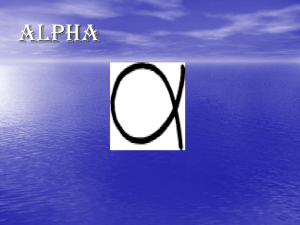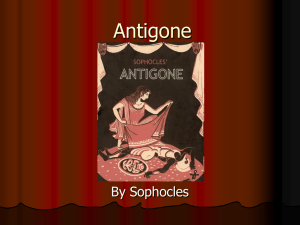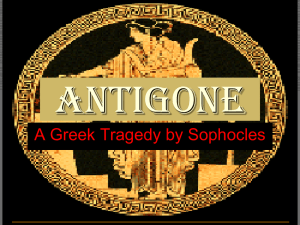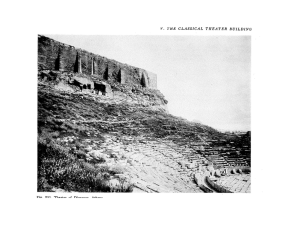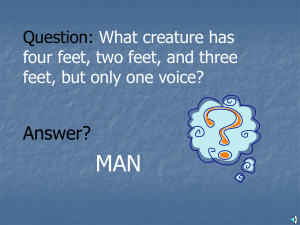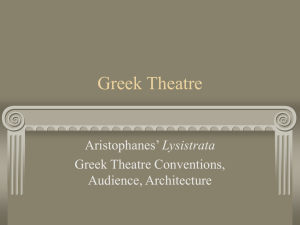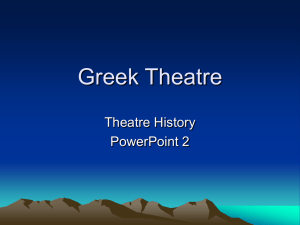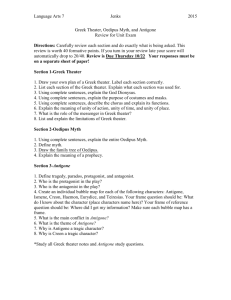A Study Guide for Sophocles` Antigone
advertisement
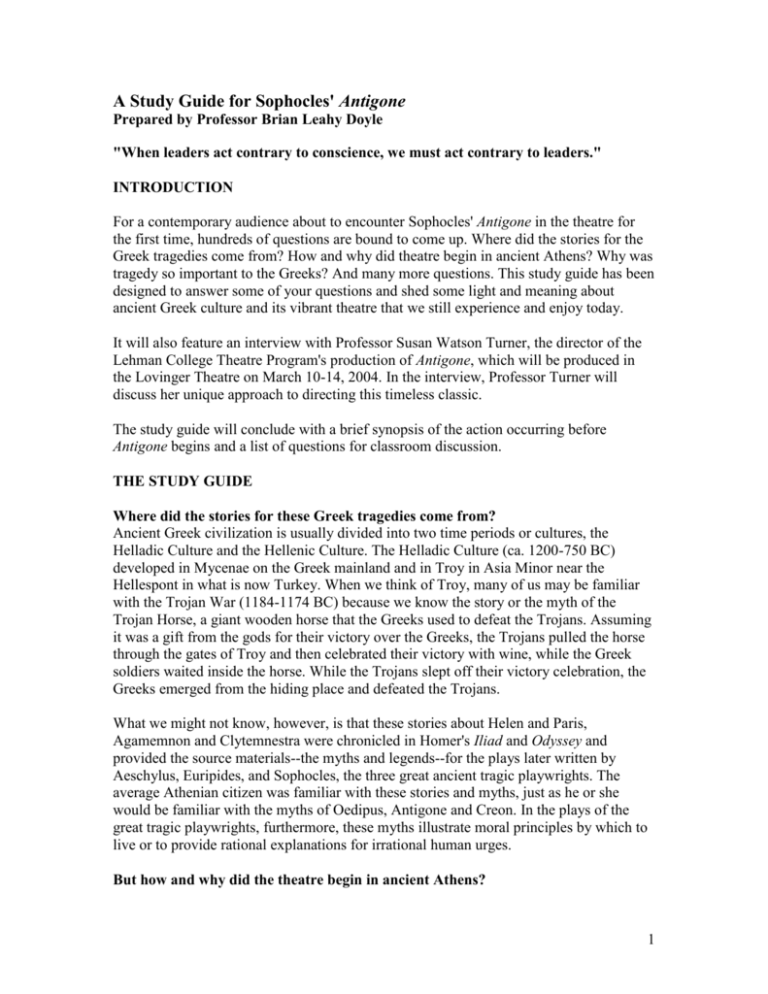
A Study Guide for Sophocles' Antigone Prepared by Professor Brian Leahy Doyle "When leaders act contrary to conscience, we must act contrary to leaders." INTRODUCTION For a contemporary audience about to encounter Sophocles' Antigone in the theatre for the first time, hundreds of questions are bound to come up. Where did the stories for the Greek tragedies come from? How and why did theatre begin in ancient Athens? Why was tragedy so important to the Greeks? And many more questions. This study guide has been designed to answer some of your questions and shed some light and meaning about ancient Greek culture and its vibrant theatre that we still experience and enjoy today. It will also feature an interview with Professor Susan Watson Turner, the director of the Lehman College Theatre Program's production of Antigone, which will be produced in the Lovinger Theatre on March 10-14, 2004. In the interview, Professor Turner will discuss her unique approach to directing this timeless classic. The study guide will conclude with a brief synopsis of the action occurring before Antigone begins and a list of questions for classroom discussion. THE STUDY GUIDE Where did the stories for these Greek tragedies come from? Ancient Greek civilization is usually divided into two time periods or cultures, the Helladic Culture and the Hellenic Culture. The Helladic Culture (ca. 1200-750 BC) developed in Mycenae on the Greek mainland and in Troy in Asia Minor near the Hellespont in what is now Turkey. When we think of Troy, many of us may be familiar with the Trojan War (1184-1174 BC) because we know the story or the myth of the Trojan Horse, a giant wooden horse that the Greeks used to defeat the Trojans. Assuming it was a gift from the gods for their victory over the Greeks, the Trojans pulled the horse through the gates of Troy and then celebrated their victory with wine, while the Greek soldiers waited inside the horse. While the Trojans slept off their victory celebration, the Greeks emerged from the hiding place and defeated the Trojans. What we might not know, however, is that these stories about Helen and Paris, Agamemnon and Clytemnestra were chronicled in Homer's Iliad and Odyssey and provided the source materials--the myths and legends--for the plays later written by Aeschylus, Euripides, and Sophocles, the three great ancient tragic playwrights. The average Athenian citizen was familiar with these stories and myths, just as he or she would be familiar with the myths of Oedipus, Antigone and Creon. In the plays of the great tragic playwrights, furthermore, these myths illustrate moral principles by which to live or to provide rational explanations for irrational human urges. But how and why did the theatre begin in ancient Athens? 1 During the Hellenic Culture (750-31 BC), the second Greek culture, the major political unit was the polis, a city-state composed of a city and its surrounding countryside. Athens--along with Sparta, Corinth and Thebes--was one of the most important and powerful Greek city-states. Around 500 BC, over 2500 years ago, two historical developments led to Athens' becoming the most important Greek city-state. First the Persian War pitted the Greeks against the Persians. While Athens was the artistic and commercial center of Greece, Sparta was the major military power. When the Persian army defeated the Spartans, things looked desperate for the Greeks until the Athenian navy defeated the Persian navy. At about the same time, Athens became the world's first democracy and, led by Pericles, entered the Periclean Age, a time when the Parthenon, the Theatre of Dionysus and other civic buildings were constructed. Flush with a strong sense of civic pride, then, the Periclean Age ushered in a Golden Age of Drama. During a one hundred-year time span (500-404 BC)--until Athens lost its predominance in the Peloponnesian War--the three great playwrights along with other writers competed in the writing of the best tragic trilogy of plays at the City Dionysia. What does the word "tragedy" mean? The source for the word "tragedy" is the Greek tragedois, or "goat song." Theatre historians don't know for certain, but they suspect that either the Greeks initially sacrificed a goat to Dionysus or gave it to the winning playwright as a prize for the best tragic trilogy. Tragedy itself originates from the dithyramb, a hymn or lyric ode sung to Dionysus, which started as an improvised story danced to and sung by a choral leader and answered with a refrain from a chorus of singer-dancers. Later, these hymns were written down. The dithyramb evolved into tragedy when Thespis stepped out of chorus and assumed character, thus becoming the very first actor. That's why today we often refer to an actor as a "thespian." Tragedy then changed from being a narrative poetic form, with strong lyrical elements, to an enacted or dramatic poetic form. Why was tragedy so important to the Greeks? The ancient Athenians honored their gods at annual festivals, with four festivals devoted to Dionysus, the god of wine, women and theatre. The most important festival, the City Dionysia, took place in the spring and offered a contest for the best trilogy of tragic plays. A wealthy citizen, or choregus, paid for training and costuming of the actors and the chorus and also supplied non-speaking supernumeraries. For three days, audiences came to the Theatre of Dionysus at daybreak to watch a trilogy of plays each day. These statesponsored festivals intertwined theatre, religion and politics and provided a forum for the civic debate that was considered necessary for the health of Athens' body politic. The tragic and--later, comic--playwrights openly criticized the gods, the government, political leaders, and society's mores and fashions, etc. Also, one of the fundamental aspects of the ancient Greek ethos was the need to look at life from a cosmological worldview. Living in the prospering democracy that was Athens, the great tragic playwrights wrote plays that explored man's relationship to the gods, the conflict between the individual and the state, and the role of fate in determining the outcome of one's life. These writers were not afraid to ask "Why?" nor were their audiences afraid to ponder over their own responses. How did the ancient Athenians produce the plays? 2 Each playwright was provided with three male actors, who played all of the roles regardless of the age or gender of the characters. The playwrights themselves usually directed as well as often acted in their plays. Sophocles' contemporary, Aeschylus, for instance, was credited with possessing an excellent voice and bearing as an actor. He usually acted the protagonist, or first-actor, roles in his plays. Sophocles tried his hand at acting, but he found that he did not possess a strong voice and so chose to focus on writing. Besides the protagonist, each playwright was also assigned an antagonist, or second actor, who played those characters who are in opposition to the main character or protagonist. The third actor was called the tritagonist, and he played the smaller roles in each play, usually messengers and shepherds. Along with the supernumeraries, who performed the non-speaking roles, each playwright was also assigned a tragic chorus which consisted of 12 or 15 chorus members. If three male actors played all of the roles, including the women characters, what was the style of acting like? The style of acting can best be described as "nonrealistic." For starters, each actor wore a mask made of light wood, cork or linen for each character he played. The face of the mask, or persona, indicated the age, social standing and sex of the character as well as the character's dominant emotion, such as fear, rage, hate, despair. Each mask fit the actor's face, and the mask may have had a wig attached to it and an open mouthpiece that allowed for clear speech. To a large extent, the actor relied upon his mask and slow, stylized gestures to convey his character. This very slow, stylized movement was fundamentally necessary for performing in a large performance space like the Theatre of Dionysus, which seated 20,000 people in its final form. While theatres like the Theatre of Dionysus and the Theatre at Epidauros possessed truly excellent acoustics, Greek actors also placed a high premium upon vocal quality. The actors needed to be comfortable in projecting their voices into a large auditorium and relied upon vocal range and expressiveness to convey character. Their speeches, recitatives and songs were often spoken and sung in harmony to composed music, much like opera is performed today. The delivery of the actors' speeches, then, was more declamatory than "realistic" in tone. In fact, the actor was often more concerned with portraying an emotional tone than in depicting the age or gender of his character. Finally, the chorus played a very important role in the Greek theatre. Usually composed of 12-15 members and led by a choral leader, the chorus sang and danced to the choral odes or stasima. Depending upon the play, the chorus portrayed the citizens or elders of the community. They also functioned in the play by providing exposition (or background information), commentary, narration and criticism of the motivations of the main characters. In some of the plays, the chorus also introduced a new character as he or she makes a first entrance, thus aiding the audience in quickly understanding the play's dramatis personae. What did the plays consist of besides the stasima? The structure of a Greek tragedy usually began with a prologos (or prologue), a scene that provides dramatic exposition and usually introduces the play's main characters. 3 Following the prologos is the parados, the choral ode in which the chorus enters or "parades" into the theatre. Then come a series of episodes, or dramatic scenes, and stasima, with each episode followed by a stasima. (Episode, by the way, means "between the songs.") Following the last episode is the exodos, or the exit ode of the chorus, the chorus's last song. Sometimes, too, the play might also end with an epilogos (or epilogue), a scene which would provide closure to the dramatic events. An Interview with Susan Watson Turner Director and producer Susan Watson Turner began her career in Cleveland, Ohio, at the Karamu Theatre. She began acting at the Karamu and discovered her now favorite theatrical activity, directing. She has directed educational, community, regional, off-off Broadway, and off - Broadway theatre. When reviewing her production of North 17th Street by Clay Goss, Ben Brantley in The New York Times referred to her directorial skill "as elegant choreography." For several years, Ms. Watson Turner served as General Manager and Producing Director at the Negro Ensemble Company, where she worked on A Soldier's Play, Lifetimes on the Streets, Home, The Absolution of Willie Mae, and many other plays. During her term at NEC, she had the opportunity to work with such talented actors, directors, designers and writers as Frances Foster, Joseph Walker, Samm-Art Williams, Denzel Washington, Wynn Thomas, Samuel L. Jackson and Douglas Turner Ward. Ms. Turner has worked at the Village Gate Theatre, where she co-authored the play Just A Night Out and the longest-running Black musical in America, Mama I Want To Sing by Vy Higgensen. Ms. Watson Turner has been a professor of theatre for Orange County Community College, Bronx Community College and now Lehman College. She is the recipient of a Doctoral Equivalency from the Board of Trustees-City University of New York for Achievements in Theatre. She also holds an MFA from Columbia University and a BFA from Ohio University. As always she would like to thank her husband, Richard, and her family for all their support. To God be the Glory--for all the things He has done! You've mentioned that leadership is an important theme or component in terms of your directorial interpretation of Antigone. Given our nation's current political situation, how does Antigone speak to some of the issues that we Americans face in the early part of the twenty-first century? Susan Watson Turner: As Americans we have become very "lazy" when it comes to politics. We sway the way the media pushes us and spend very little time investigating the real backgrounds, qualifications and wisdom of our candidates and ultimately leaders. I found a quote that encapsulates my directorial approach: "When leaders act contrary to conscience, we must act contrary to leaders." The inequities we watch today (via TV, newspapers and the Internet) are in some cases parallel to the actions of Creon. What do we do as individuals--as citizens, as artists, as teachers--to encourage action against what we know and understand to be unjust behavior? Sophocles wrote Antigone in 442 or 441 BC. Besides exploring the role of leadership, in what ways does the play reverberate for contemporary audiences? In other words, why should we read or see or listen to this play today? 4 SWT: I think my response above also answers this question. However, the "real" tragedy that Sophocles could not have imagined in 442 BC is that thousands of years later we would not have learned from this straightforward example of how arrogance, abuse and ego have the potential to destroy humanity. In fact, his references to mythological punishments from the gods for vanity, selfishness and arrogance (i.e., Niobe's Tears) are placed to support his position. Sophocles' play is support for my contemporary position. For example, our continued abuse of our environment is captured in the prologue of this translation. We find the chorus in a barren uninhabitable land suffering the results of environmental abuse. Sophocles has written a choral speech which refers to "Earth as a goddess. She never ages, never grows tired. Yet, man wears her away." And today, my fish still die in tap water! Have we understood the message Sophocles intended? Ancient Athenian theatre practice combined music, dance, spectacle, song and language in order to tell a story, retell a myth or portray a dramatic event close to the audience's sensibilities. Describe how the work of your collaborators--the work of your choreographer and your designers--may perhaps dramatize or theatricalize the production. SWT: The choreography by Dyane Harvey heightens the element of spectacle. The dance lends itself to myth by reinforcing the words of the storyteller/chorus visually through body language. The chorus extends reality and becomes a vehicle for the gods to impact man. Richard Ellis (set designer) and Ken Ross (lighting designer) are developing a visual look that is "larger than life" and provides periodic elements of surprise. The set will open magically to reveal entrances, and the orchestra pit will rise and fall amidst smoke and sound which will heighten the performance visually. The sound, composed by Richard V. Turner, will combine natural sound and composed music. Special sound f/x will shake the stage and topple the elements in full surround sound into the audiences' lap. Given the proscenium nature of the Lovinger Theatre, we will rely on the sound and chorus to bridge the distance between the large stage and intimate message. As the gods grant us, one of our cast members is a professional magician, and he will add his special talent of magic as part of the victory celebration. The convention I'm using to keep the contemporary audience's attention is to enact the choral sections and keep the language simple. In what ways--if any--are you adapting the play for a modern audience? SWT: The costumes, by costume designer Susan Soetaert, really represent the adaptation. They have the lines and style of ancient Greek fashion with a contemporary construction and fabric. The costumes reflect my concept of staying within the Greek frame and bringing contemporary hints of fashion to the visual design to aide/ease the understanding of the play. In the adaptation, I have changed words and syntax for clarity's sake, staying true, I hope, to the rhythms of Greek language and speech. Of course, the rainbow of skin tones and ethnicities are being forced into the Greek frame--such is the need to "color," for lack of a better word, the other sensual elements (i.e. the music will have little Greek 5 sound--will attempt to be timeless--but have hints of modern and African-based sounds provided by the percussion instrumentation. It also helps to have a beat!) Why have you chosen those adaptations? SWT: Clarity, Clarity, Clarity, Clarity. My goal is to make this production exciting, entertaining and engaging. I have furthered the adaptation to portray the Antigone's hanging, Haemon's suicide, as well as Eurydice's self-destruction to bloodily illustrate the reality of Creon's mistake. We see participate and experience the tragedy. We are not casual observers. My goal is that we experience this pain as audience members and share in the responsibility with the chorus when we do not speak out or speak out too late! Synopsis of Oedipus Rex A common misconception about Antigone is that Sophocles wrote it as the second play of a tragic trilogy of plays. Nothing could be further from the truth, as Antigone was written in 442 or 441 BC and Oedipus Rex and Oedipus at Colonus were written in 430-425 BC and 406 BC respectively. These three plays, though, are thematically related and often referred to as the "Oedipal Cycle" or the "Theban Plays" since they explore the myth of Oedipus. The story begins when the Oracle of Delphi predicts that King Laius of Thebes will be killed by his infant son, Oedipus. Laius and Jocasta, Oedipus's mother, decide to abandon the child on a mountainside to die. But the child is saved by a shepherd and taken to Corinth, where he is raised by Polybus and Merope, the king and queen of Corinth. When Oedipus hears of the prophecy that he will kill his father and marry his mother, however, he leaves Corinth, not aware that Polybus and Merope are not his real parents. Along the road to Thebes, he encounters Laius, and the two men get into an argument, which results in Oedipus killing Laius. Soon thereafter Oedipus arrives in Thebes and saves the city by answering the Riddle of the Sphinx. He is proclaimed the king of Thebes and married to Jocasta, with whom he sires four children, Polynices, Eteocles, Ismene and Antigone. When Oedipus Rex begins, a plague has descended upon Thebes. The Oracle at Delphi tells Oedipus that he must end the plague by finding and punishing the murderer of King Laius. Acting rashly and unwittingly, Oedipus declares that Laius's murderer will be banished from Thebes. Over the course of the play, Oedipus discovers that he himself has murdered Laius and married Jocasta. Confronted with the truth of Oedipus' identity, Jocasta hangs herself and Oedipus blinds himself, leaving Thebes and his young children, Antigone and Ismene in Creon's care. Creon, Jocasta's brother, is chosen to rule Thebes until one of Oedipus's sons, Eteocles or Polynices, is old enough to rule. The two brothers agree to rule Thebes jointly, but Eteocles reneges on their agreement. Polynices raises an army to fight his brother and claim the throne, and in a battle both Eteocles and Polynices die. Creon declares himself the king, gives Eteocles a proper burial, but decrees that Polynices as a traitor to Thebes must not be given a proper burial rituals. At this point Sophocles' Antigone begins. 6 QUESTIONS FOR DISCUSSION: The following questions have been designed for a classroom discussion of Antigone either after you have read the play or seen the Lehman College Theatre Program production. 1. Does Antigone have the right to defy Creon by burying her brother, Polynices? Why do you think that she feels she has this right? 2. Does Creon have the right to enforce the laws of society by punishing the person who gives Polynices a burial? 3. What might be Creon's motivation for having denied Polynices a burial? 4. Who is the protagonist in the play, Antigone or Creon? Why do you think that this character is the protagonist? 5. Antigone is considered one of the greatest roles for an actress to play. Do you think, though, that she is more than a flesh-and-blood character, that she represents some sort of an idea or ideal? If so, what is that idea or ideal? 7 6. Works Consulted Brockett, Oscar G., Franklin J. Hildy, History of the Theatre. Boston: Allyn and Bacon, 1999. Hathorn, Richard Y. Crowell’s Handbook of Classical Drama. New York: Thomas Y. Crowell Company, 1967. Sophocles. Robert Fagles, trans. The Three Theban Plays. New York: Penguin Books, 1984. Watson, Jack Watson, Grant McKernie, A Cultural History of Theatre. New York:Longman, 1993. Watson Turner, Susan. Personal interview, 15 February 2004. ……………. Personal interview, 31 August 2004. 8

